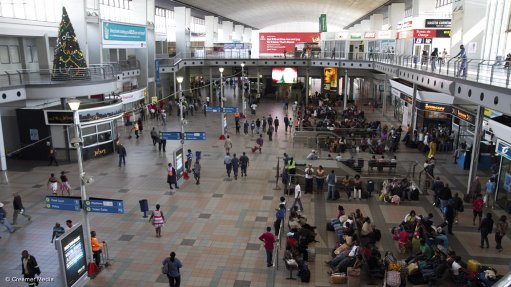
Park station, in Johannesburg
Autopax must pay its outstanding debt by August 15, or the bus service will be refused access to the train stations operated by the Passenger Rail Agency of South Africa (PRASA).
PRASA operates the Metrorail commuter rail and Shosholoza Meyl long-distance rail services.
Autopax is the holding company of two South African intercity bus services and a wholly owned subsidiary of PRASA.
In a letter sent by PRASA Corporate Real Estate Solutions (CRES), to Autopax, PRASA CRES indicates that this action is owing to the nonpayment of the “cumulative debt amount of approximately R80-million owed by Autopax, where PRASA CRES has exhausted all efforts of collection of the monies from Autopax”.
The letter, written by PRASA CRES acting CEO Nathi Khena, indicates that the debt has been “accumulating for some time now”.
He states that the nonpayment of the debt has resulted in “the perception by the bus industry in general”, that Autopax is being granted favourable trading terms, with access to facilities permitted in spite of the outstanding debt.
Khena indicates that other, non-State-owned bus operators are also now refusing to “make rent payments”, in light of Autopax’s nonpayment.
The letter is especially noteworthy as PRASA and Autopax have been fingered for potential anticompetitive behaviour in the preliminary findings of the Competition Commission’s Public Passenger Transport Market Inquiry, released earlier this year.
According to these findings, the relationship between PRASA, as custodian of key intermodal facilities, such as at Park station, in Johannesburg, and Autopax, as an active participant in interprovincial bus services, have led to competition distortions.
Autopax seems to receive preferential treatment compared with other bus operators, notes the commission, as it has an exclusive loading area at Park station, for example, while other bus operators have to share loading areas.
The preliminary findings also point to the fact that PRASA does not pursue Autopax for payment for these facilities as it does with other bus operators, competing with Autopax.
Autopax also appears “very inefficient” with high debt, but continues to receive funding – “protection” – from PRASA.
The Competition Commission says it questions whether the State should be involved in intercity bus services as there is no market failure in the sector, with the State normally participating where there exists such failure.
The Autopax Passenger Services Business Plan 2019/20 indicates that the company at the end of the 2018/19 financial year had historic debt, accumulated over the past three years, of around R206-million and R604-million, which is made up of external creditors and PRASA debt, respectively.
The report also indicates that half of the Autopax bus fleet is parked at the depot, or with service providers, owing to either mechanical breakdowns or accidents.
The current fleet is more than eight years old, and 60% of the fleet have exceeded 800 000 km, states the business plan.
PRASA did not respond to a request for comment from Engineering News Online.